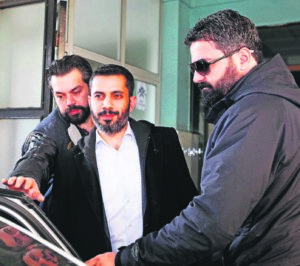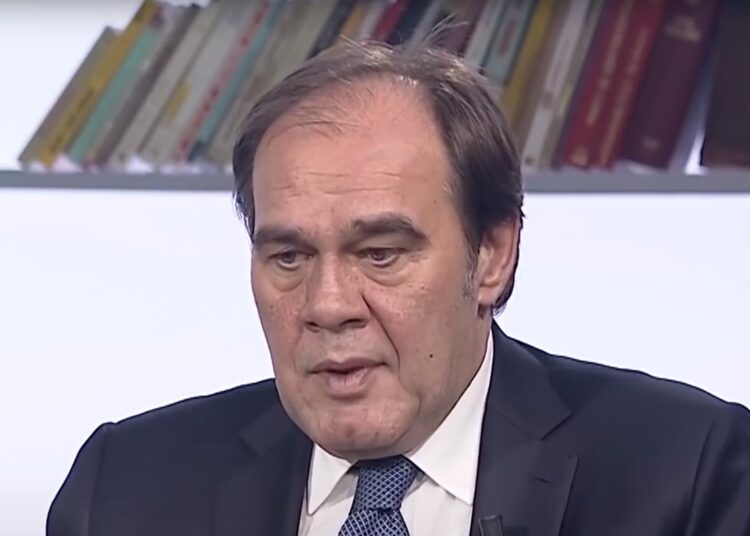Abdullah Bozkurt/Stockholm
Yıldırım Demirören, a media mogul and former head of the Turkish Football Federation (TFF), falsified birth records to hide his sexual relationship with an underage girl who became pregnant and gave birth to his baby.
The claim about the married businessman was first made by investigative journalist Mehmet Baransu, who had also uncovered confidential documents about how the Demirören family enriched itself by murdering a Turkish-Greek couple and plundering their wealth.
Demirören enjoys a close relationship with Turkish President Recep Tayyip Erdogan and directs the media outlets he owns to spread propaganda for the president and his ruling Justice and Development Party (AKP).
According to Baransu, Demirören paid off a man who was working for the Beşiktaş Football Club, of which Demirören was president at the time, to register himself as the father of the child to cover up his relationship with the girl. The man was later transferred to the TFF when Demirören became the organization’s president with the help of President Erdogan.
When the allegation of his affair with an underage girl first appeared in a report written by Baransu, Demirören dismissed the accusation as defamation and had his lawyers sue Baransu to intimidate the journalist into retracting the article. The case was tried in a court in Istanbul’s Bakirköy district.
Demirören’s attempt at intimidation fell apart when Baransu’s lawyer filed a petition with the court to conduct a DNA test on the baby to determine whether Demirören was the father. The panicked Demirören’s lawyers withdrew the frivolous lawsuit, and the journalist was acquitted of all charges leveled against him.
Court testimony of Mehmet Baransu in October 2018 during which he testified that Yıldırım Demirören had a baby with an underage girl and covered it up:
Testifying at the Istanbul 23rd High Criminal Court in October 2018, Baransu discussed the case and said, “I wrote about these dirty relationships, Your Honor. I wrote about this filthy world. I wrote because people who couldn’t write about these things shared them with me.”
If the case had moved forward and the DNA test proved Demirören to be the father, he would have been subject to criminal charges under Turkish law and faced up to five years in prison.
Demirören runs the eponymous family holding and has been active in the gas, oil, real estate and media sectors. With a $750 million loan from Turkish state lender Ziraat Bank, the Demirören group purchased Doğan Media on March 22, 2018, which included the Hürriyet newspaper, broadcaster CNN Türk and mainstream TV station Kanal D, turning all of them into government mouthpieces. Yıldırım reportedly never repaid the loan, and the government ignored parliamentary questions on its fate.
In exchange for turning media outlets into mouthpieces for the Erdogan government, Demirören enjoys immunity from any legal troubles he may face.
In the meantime Baransu, a prominent investigative journalist who broke dozens of agenda-setting headline stories in his career, has been wrongfully jailed by Erdogan since March 2015 as part of a government campaign to muzzle critical voices in the Turkish press and intimidate investigative journalists.
Yet, even from behind bars, Baransu manages to put the unlawful activities he had uncovered during his work as a journalist into the official record when he appears in court to defend himself against ludicrous charges filed by the government to keep him in prison for the rest of his life.
He has been using his defense platform in the courtroom during hearings to disclose what and how he discovered the shady and illegal activities of powerful people in politics, business and sports.
Baransu’s investigative work has exposed renegade neo-nationalist generals in the Turkish army who were suspected of plotting to assassinate non-Muslim community leaders in Turkey in 2010 and also revealed how the National Intelligence Organization (MIT) provided faulty intelligence by portraying smugglers as terrorists that got 35 villagers in Uludere killed in an aerial bombing in December 2011.
He published government documents that unveiled massive profiling of unsuspecting, innocent citizens including members of the opposition parties based on their ethnic, religious, ideological or political affiliations by the Erdogan government in violation of their constitutional right to privacy in 2013; covered corruption in Erdogan’s inner circle; and wrote extensively about match-fixing scandals in Turkey’s football clubs.

In 2010 he wrote a book titled “Karargah” (Command Center), and published classified documents that revealed the army’s secret, modified plans to fight perceived domestic threats by recruiting civilians and forming “counter-guerilla” squads that were tasked with conducting unconventional or psychological warfare.
The original unconventional warfare plan was drawn up in 1977 specifically against foreign threats, but in 2007 then-Chief of General Staff Gen. Yaşar Büyükanıt, a neo-nationalist general, ordered the plans to be modified to counter internal threats.
In another book he penned under the title of “Mösyö: Hanefi Avcı’nın Yazamadıkları” (Monsieur: The Things Hanefi Avcı Couldn’t Write), Baransu revealed official documents that showed the acts of torture perpetrated by former police chief Avcı during his career and the shady connections he forged with the Revolutionary Headquarters leftist, terrorist organization .
His arrest in 2015 drew criticism from Brussels and Washington. The United States expressed concern regarding the arrest of the journalist, urging Turkish authorities to conduct the investigation in a fair, transparent and democratic manner. State Department Deputy Spokesperson Marie Harf said the freedom of journalists to operate in Turkey was among Washington’s ongoing concerns.
“A journalist’s job is to report on developments in the public interest, and it is absurd that a journalist should be prosecuted for obtaining documents — which in any case were shared with authorities,” CPJ Europe and Central Asia Program Coordinator Nina Ognianova said at the time. “We call on Turkish authorities to immediately release Mehmet Baransu from custody and drop all charges against him.”
But the Erdogan government turned a deaf ear to such calls and has kept him in jail until the present day.












